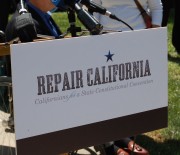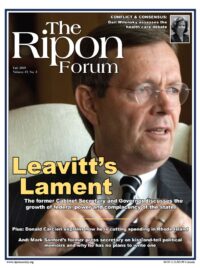 Are you ready to put on your white wigs?” That is a question I have been posing lately to many everyday Californians, as the Golden State considers if a constitutional convention composed of regular folks might hold the solution to California’s ongoing political and budgetary woes.
Are you ready to put on your white wigs?” That is a question I have been posing lately to many everyday Californians, as the Golden State considers if a constitutional convention composed of regular folks might hold the solution to California’s ongoing political and budgetary woes.
California used to be known as a place of innovation and forward-thinking policy, but today it is known as a state that issues IOUs to pay its bills. With state government in Sacramento seemingly frozen in place, a group of California leaders formed RepairCalifornia.org to propose a constitutional convention as a way to address the state’s deeply entrenched structural problems.
But this would be no ordinary convention. Approximately 60 percent of the 500 or so participants would be “citizen delegates,” everyday people who have been scientifically selected to convene a broad cross-section of California. The other 40 percent would be delegates appointed by local government officials. This innovative hybrid would attempt to bring together into the same room both the expertise of those with policy knowledge and political experience as well as the values of regular people who are not concerned about their political careers or partisanship, but instead can focus on what’s good for their state.
With state government in Sacramento seemingly frozen in place, a group of California leaders formed RepairCalifornia.org to propose a constitutional convention as a way to address the state’s deeply entrenched structural problems.
Over two dozen “town hall” meetings have been held throughout California with each event filled to capacity with hundreds of Californians concerned about the future. When I have asked them, “How many of you think YOU would be a good delegate to the convention?” typically 90 percent of the hands in the room shoot up. While Californians have lost faith in their government and their elected leaders, opinion polls consistently show that Californians trust themselves more than they trust the “experts.” Thus, this kind of People’s Convention could be well-suited to California’s culture that has relied for decades — often to its detriment — on popular referendums and initiatives.
The California state constitution is the third longest constitution in the world, having been amended over 500 times. Many of the amendments have come as a result of an initiative process that has been captured by big-money interests that can buy their way onto the California ballot with their pet project. This has happened over and over in California, to the point where the constitution has become a disjointed hodgepodge with things like golf courses, gill net fishing and other unconstitutional matters embedded into the Constitution. Some of the previous amendments have dedicated state revenues for funding pet projects to the point where they have tied the hands of the legislature to craft a sensible budget. This in turn has led to a structural deficit where California spends more money than it takes in.
Repair California, the umbrella group that is spearheading this effort, is led by the Bay Area Council which represents 275 of the largest employers in the Bay Area, including Google, Oracle, HP and many others. Other organizations who have endorsed a constitutional convention include Common Cause, the Los Angeles Times and other local newspapers. The convention would be a “limited” one, with a mandate narrowly tailored to those parts of the Constitution that deal with the structure of government.
The California state constitution is the third longest constitution in the world, having been amended over 500 times.
The four areas in which the delegates would be empowered to propose reforms would be in governance, elections (including the initiative and referendum process), budgetary and revenue rules, and the relationship between local and state government in terms of revenue sharing. Social policies and potential wedge issues such as gay marriage, gun control and education would be off the table. Proposition 13, the law passed by voters in 1978 that reconfigured property tax laws, would dance around the edges of the convention, which would be allowed to propose changes but not to legislate any tax increases. The convention is not designed to be a parallel legislature, but rather to update and modernize the rules that define government and its powers in California.
If California voters approve of a ballot measure that will be on the November 2010 ballot to call the convention, the convention will meet beginning in the spring of 2011 for approximately eight months. The delegates would be paid for their participation, and would hear from experts from all political sides. The convention also would hold a dozen public hearings throughout the state, as well as use all of the modern technologies available today — the Internet, e-mail, live webcasting, instant polling and more — to engage Californians and bring them into the conversation. Utilizing these techniques, California could mount a constitutional convention the likes of which has never been seen. It has the potential to stimulate a badly needed civic dialogue that has been missing not only in California but all across the United States. The convention would have the power to place their proposals directly on the November 2012 ballot, where their fellow Californians would vote up or down on the proposed reforms.
While opinion polls show that Californians very much support reform and want change, nevertheless many previous efforts at political reform have failed. Initiatives have been voted down in recent years to extend term limits, enact a “top two” primary, public financing of campaigns, election day registration and other reforms. Only recently did Californians barely approve a measure to create an independent redistricting commission, after numerous attempts. What is clear is that Californians often don’t trust the proposers of reform, especially when the Legislature puts a measure on the ballot. The Legislature has little credibility at this point, nor do others who are perceived as political insiders or even so-called experts.
That’s why a constitutional convention composed mostly of everyday Californians is being viewed as crucial to success. The convention itself in essence would be an ongoing focus group in which the proposals and reforms would be vetted by a large pool of people who would be just like the voters who eventually will decide whether to enact the proposals of the convention. There have been numerous examples in the United States and abroad showing that the citizen-as-delegate model has worked well in a range of circumstances.
For example, in post-Katrina New Orleans, 4,000 citizen delegates scattered in 21 cities were simultaneously convened to decide how to spend scarce rebuilding dollars after federal and state authorities grossly mismanaged the recovery. In California and other states, citizen delegates have been used in a range of forums involving hundreds of people to advance solutions to contentious issues such as tax reform, health care, housing and regional development. The delegates are provided with professional staff and facilitators, and undergo a thorough education process, hearing from a range of experts about the problems and potential solutions. By the end, the delegates themselves have become experts.
Says Steve Rosell, a deliberative democracy practitioner from San Diego-based Viewpoint Learning, “Many people enter these events with strongly held political beliefs, but usually they are far more interested in finding workable solutions than in adhering to a particular ideology. As a result participants’ conclusions often have a common-sense, practical quality.”
This aspect of citizen delegates — a focus on what works instead of ideology, partisanship or career self-interest — is exactly what California needs. With California grappling with a crisis of historic proportions, many people feel it is time to draw upon the genius of what has always been the Golden State’s greatest resource — Californians themselves.
If the convention works in California, it may initiate a wave that could sweep the country. Inspired in part by California, already Rudy Giuliani has called for a constitutional convention to be held in New York. So as you ride the bus or freeway to work tomorrow, ask yourself: Can the person seated next to me, or driving past me, be trusted with the job of redesigning the basic political and budgetary rules?
Are everyday Californians ready to don the white powdered wigs to become the Founding Mothers and Fathers of a new California?
Stay tuned.
–###–
Steven Hill is Director of the Political Reform Program of the New America Foundation and author of “10 Steps to Repair American Democracy” (www.10Steps.net).




